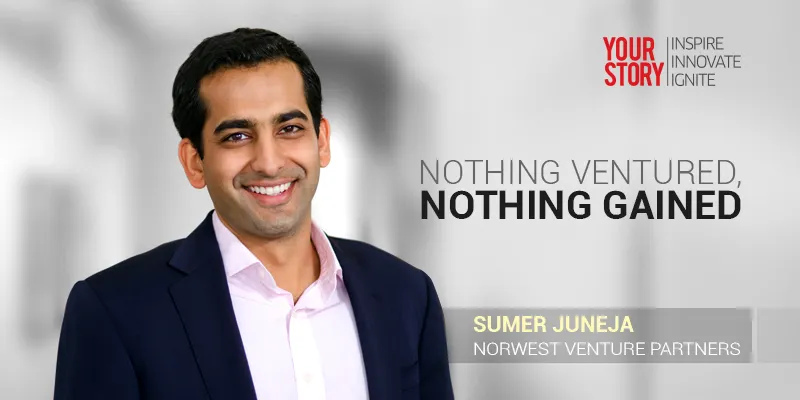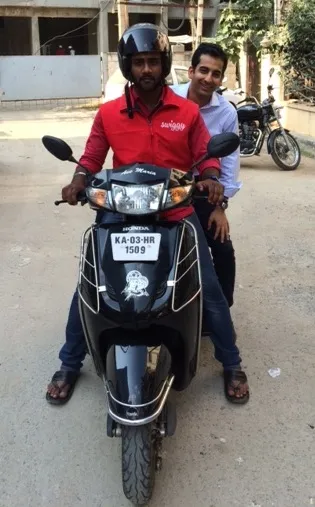Nothing Ventured, Nothing Gained : Meet the VC who hustles
'Nothing Ventured, Nothing Gained’ is a series on Venture Capitalists in India where we will bring you their stories, both official and the not so official! An insight into the minds of these mavericks of finance and what makes them tick. In the first of this series, we talk to Sumer Juneja of Norwest Venture Partners. Listen in.

Meet the VC who hustles
With investments in Indian startups at an all-time high, it is getting intense not just for entrepreneurs but also for investors and venture capitalists. Today, for an investor who joins the board of a company, it’s not just the money, but the intensity, business acumen and relationships that he/she brings to the organisation, that attract the entrepreneur. "After all as a VC, you need to keep pace with an entrepreneur, have your finger on the pulse of the market and not just give an arm-chair view of what you think is right," says SumerJuneja of Norwest Venture Partners over a cup of coffee. Sumer serves as an advisor on equity investments in Indian companies. Ten years into the investment industry, Sumer has come a long way from being an investment-banking analyst at Goldman Sachs to being Principal at Norwest India. But what made me curious to meet Sumer was the buzz I heard from entrepreneurs about the passion and drive he brings to deal making.
Not your regular VC
Sumer is not your regular VC. He believes in running as hard as any entrepreneur.
Take for instance the Swiggy deal, which Sumer closed amidst competition from other funds. What I heard from the grapevine is that Sumer parked himself in Bangalore (he is based out of Mumbai) for a week to close the deal amidst various other offers being made to the Swiggy founders. He says,
We started studying this space from October of last year and went on a food tour across the country where we visited kitchens and tasted food prepared by all the food-tech companies we were evaluating at the time.”
“I am just happy my stomach held up,” he laughs. “We met the Swiggy team in December and had two more follow up interactions in January and February. We were following their traction and knew that we wanted to work with this team."
Food tech and the key question
The Food-tech segment is drawing a lot of investor interest and we have seen multiple deals closing in the sector over the last 10 months. At Norwest, Sumer had been closely tracking the offline food segment and that, along with his internet investment experience, gave him a unique perspective into the newly emerging internet enabled food-tech sector. He says,
In markets like Bangkok and Singapore, people eat out twice a day. In US and China, the market is already hot and growing rapidly. In India, people are eating out more and more now, and this trend will only grow, with double income households. Clearly, it enjoys huge share of a consumer's wallet.
The Food tech sector can be broadly divided into the following models:
- Aggregation
- Aggregation with delivery
- Restaurant in the cloud
According to him, from the consumer standpoint, what matters is the choice of food and how fast it is delivered. He observed that Swiggy was doing well in a short span of time in the aggregation with delivery space. He also predicts that restaurants in the cloud are poised to break out next, specifically players who focus on food quality will emerge as the winners. “We believe that the billion-dollar food delivery market is poised to be disrupted across different segments in the next 1-2 years,” says Sumer. “We had met over 30 companies in the sector before we invested in Swiggy and believe when we make our next investment in this sector, there will be a significant number of strong companies in the space.”
An investor who didn’t startup
Sumer has not been an entrepreneur before, a trait which is perhaps fairly common among investors in India. However, Sumer views this as an asset since he has had his tryst with finance to understand the importance of numbers and the micro picture at all times. He says,
Given my background, I bring different angles to the table for fast growing companies. They are growing at a very fast pace and are always seeking what to look for next. You need to keep an eye on the basics, unit economics and growth of the company. If you’re comfortable with numbers (growth rate, revenues, key costs, cash burn and others) that matters the most at the end of the day.

Sumer believes that the CEO's role in a startup grows bigger with the growth of the company. It should become less operational and focus more on thinking about what’s next. It is important that there are processes in place and the CEO has access to the key data to derive intelligence and understanding out of it. Sumer makes sure that these kinds of dynamics which are a must for first time CEOs are introduced when he becomes a part of the company.I asked Sriharsha Majety, the co-founder at Swiggy on what his working dynamics are with his new investor and this is what he said.
Apart from being patient with our execution (big win already), Sumer's been of incredible help with multiple parts of the business including connections to restaurants, investors, hiring for key talent and what not. He's looked at the food-tech space very closely and understands it like very few people do, and his inputs have definitely helped us chart out our strategies for the future with great clarity.
The ‘micro’ learning
Sumer has learnt a lot in the last six years at Norwest. While the bird’s eye view of the Indian startup ecosystem and the country is ever exciting, he believes that the micro part is going to play a key role as well. He says,
When it comes to the macro picture, India has everything going for it. Our mobile internet users, per capita income, domestic consumption, middle class, everything is growing and supporting the decision to invest in India (startups). But the real challenge is at the micro level. For example, a restaurant in Mumbai needs 20+ licenses to launch. Delivery boys have to face navigation and other issues because of poor internet connectivity.
Sumer believes that working on the micro part requires a lot of hard work but it pays off well given the cyclic nature of growth. In his opinion, when the growth cycle turns in a good market, what will matter most is solid execution with sensible business economics. He has seen those entrepreneurs who have an eye for the bottom line doing very well. In short, Sumer’s investment philosophy revolves around the team. In fact, one can summarise it as,‘He backs a man with the plan’.
Sumer is a patient man. He’s learning with each investment. He says,
Entrepreneurs miss plans, don’t presume they will always hit them as they are also learning. Things are going well now but most of the eco-system is still maturing and you cannot be in the place of complacency.
Not just about being smart
One of the things that makes Sumer stand out from the crowd (something which I also experienced during the short coffee chat that we had), is the importance of being a good human being. It is not just important to be smart, but to also be a good person as that is what will make people want to work with you.
From the entrepreneurs that I spoke to while working on this story, I got a unanimous response that Sumer is one of those VCs who they wanted to not just meet in the boardroom but also in a pub over a beer.







